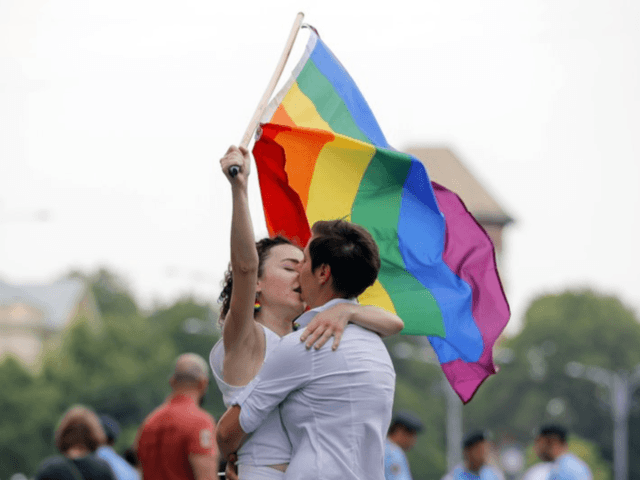A group of 13 same-sex couples in Japan plans to file a lawsuit Thursday challenging their legal inability to marry, depriving them of the ability to inherit property from their partners, make meaningful medical decisions in cases of emergency, and other rights.
Homosexuality is legal in Japan, though same-sex marriage is not on a national level and, despite no significant religious basis for opposition, attitudes towards LGBT people have largely remained negative. Support for same-sex marriage laws has increased among younger Japanese, however, and many in the community hope that approval will buoy the lawsuit to success, though it may take years to process.
The Japanese newspaper Asahi Shimbun details that the couples are demanding legal recognition of their union and 1 million yen ($9,000) per plaintiff in damages from the government for violating their constitutional rights. The couples’ lawyers will argue that the nation’s Civil Law, which governs marriage, does not explicitly ban same-sex marriage, nor are there any provisions in place that definitively ban the practice, making government officials’ refusal to allow the marriages illegal.
The lawsuits are scheduled to be filed throughout Japan, from northern regional capital Sapporo to southern Osaka, on Thursday.
“There are a large number of same-sex couples in Japan who have built their relationships as longtime partners, have lived as members of a local community and wished for the restoration of their dignity,” Asami Nishikawa, who joined the lawsuit along with partner Haru Ono, told Asahi. The women have lived together for 14 years, according to the newspaper and each has children they live with who they had in previous marriages before coming out as gay. They fear a lack of protection for their property rights and custody over their children.
Another same-sex couple joining the lawsuit, Ai Nakajima and Kristina Baumann, told Gay Star News that, as Baumann is not a Japanese citizen, recognition of same-sex marriage would help resolve ongoing visa issues with the Japanese government.
“The visa issue is very critical,” Nakajima told the publication. “I have heard of so many couples leaving Japan because visas are not issued to same-sex partners.”
Unlike many countries in the West and Africa that do not recognize same-sex marriages, religion appears to be a minor factor in Japan’s attitudes towards LGBT people. Only between 20 to 30 people in Japan practice any faith, according to State Department statistics, and over half of those subscribe to Shinto, a spiritual, ritualistic religion often paired with Buddhist practices. One percent of Japanese who identify with a religion are believed to be Christians.
While many who subscribe to Shintoism do not approve of homosexuality, Shinto dogma itself has little to say about the issue.
“In Shinto, it says make many children, expand humanity, and be prosperous,” Hisae Nakamura, who presides over the Kanamara Shrine in Kawasaki, Japan, told Foreign Policy in 2015. “And yet, it’s not explicitly written anywhere that homosexuality is wrong or a sin.”
Nakamura’s father, Hirohiko Nakamura, performed as same-sex marriage at the shrine in 1999.
The Shinto requirement to “make many children” may fuel much of the anti-gay sentiment in the country, however, given the nation’s collapsing birth rates. Japan lost nearly a million people in population between 2010 and 2015 and is expected to see a 44-million-person drop by the end of the century, according to the United Nations. Its 2018 birth rate was its lowest since 1899. A 2017 poll found that nearly half of Japanese people remain virgins by age 30 and those who do marry face extreme pressure not to have children at work. Women, particularly, face rigorous demands from bosses to abort any children they have while employed and threats that their careers will suffer if they choose to carry a child to term. The phenomenon is so common that the neologism “matahara” – or “maternity harassment” – was coined to describe it.
Some politicians have expressed concern that tolerance for gay people will lead to even more people choosing against procreating. Last year, lawmaker Mio Sugita faced criticism for dismissing gay and lesbian couples as “unproductive” to society because they will likely not have children at a critical time for Japan’s population growth.
“These men and women don’t bear children — in other words, they are ‘unproductive,'” Sugita argued, adding that more people would be “unhappy” if allowed to live openly LGBT.
Younger Japanese appear to be more inclined to support gay rights. A recent poll found that nearly 80 percent of Japanese citizens aged 20 to 59 support the legalization of same-sex marriage. That number rose to 87.9 percent when polling women only, as opposed to 69.2 percent support from Japanese men.

COMMENTS
Please let us know if you're having issues with commenting.